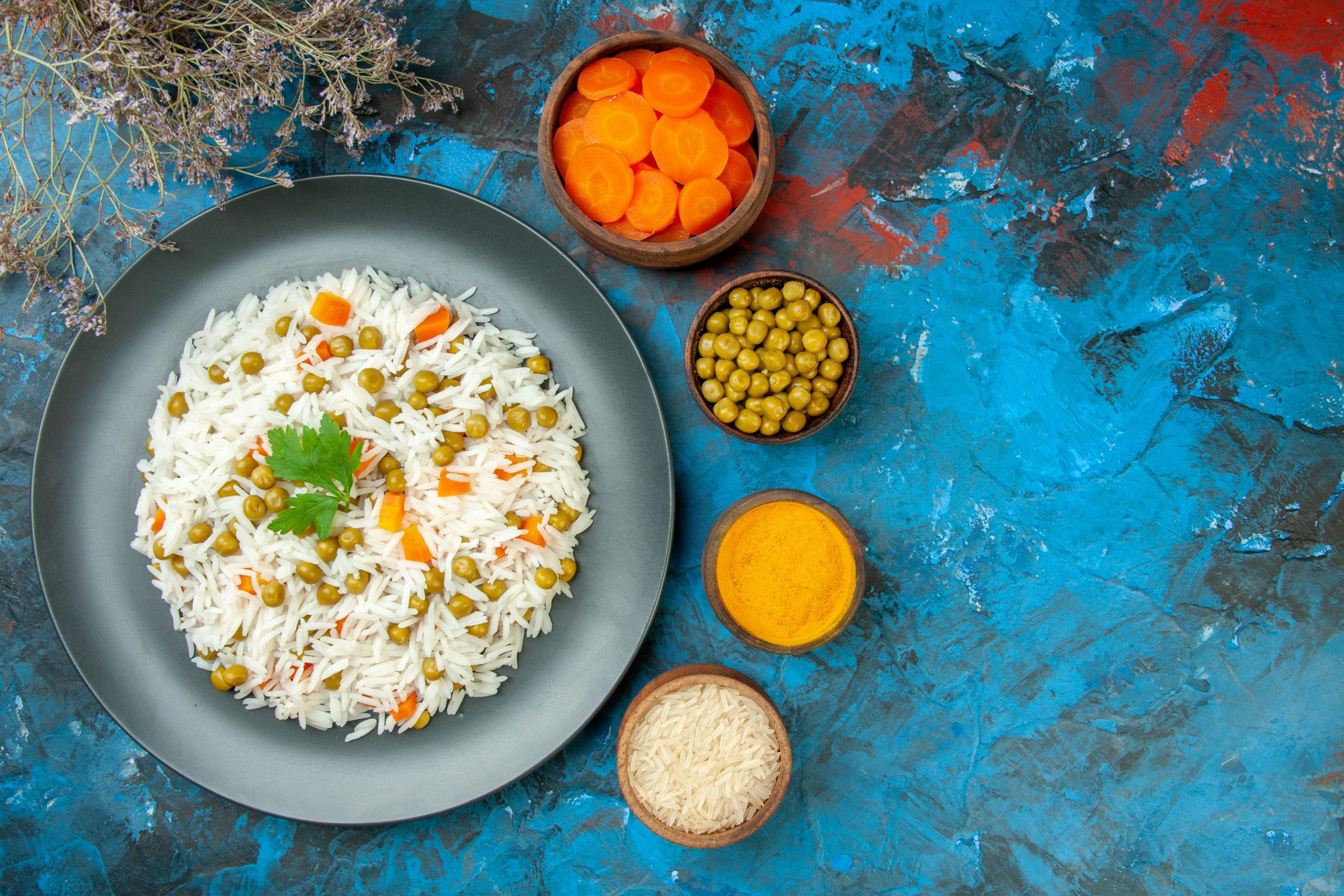Carrot biryani is a flavorful and aromatic rice dish that incorporates carrots as the main ingredient. Biryani is a popular Indian dish that consists of long-grain basmati rice cooked with various spices, vegetables, and often meat or seafood.
Carrot biryani can be enjoyed as a standalone vegetarian or vegan dish, or it can be served as a side dish alongside other curries and accompaniments. It is a wholesome and flavorful meal that is loved by many biryani enthusiasts.
How to Make Carrot Biryani?
To prepare carrot biryani, the rice is typically soaked for a while and then parboiled before being cooked with a mixture of spices, vegetables, and sometimes protein like chicken, lamb, or paneer. The spices commonly used in biryani include cumin, coriander, turmeric, cinnamon, cloves, and cardamom. The dish is usually garnished with fresh cilantro or mint leaves for added freshness.
To make carrot biryani, you’ll need the following:
Ingredients:
- 2 cups basmati rice
- 2 tablespoons ghee (clarified butter) or vegetable oil
- 1 large onion, thinly sliced
- 2 carrots, grated or thinly sliced
- 1 tablespoon ginger-garlic paste
- 1 teaspoon cumin seeds
- 1 cinnamon stick
- 2-3 green cardamom pods
- 4-5 cloves
- 1 bay leaf
- 1 teaspoon turmeric powder
- 1 teaspoon red chili powder (adjust to taste)
- 1 teaspoon biryani masala powder
- Salt to taste
- Fresh cilantro or mint leaves for garnishing
Optional ingredients:
- 1 cup of mixed vegetables (such as peas, beans, cauliflower, etc.)
- Fried onions for garnishing
Here’s a step-by-step guide to making carrot biryani:
- Rinse the basmati rice in cold water until the water runs clear. Soak the rice in water for 30 minutes. Drain the water and set the rice aside.
- Heat ghee or oil in a large pot or deep skillet over medium heat. Add the cumin seeds, cinnamon stick, cardamom pods, cloves, and bay leaf. Sauté for a minute until the spices release their aroma.
- Add the sliced onions and sauté until they turn golden brown.
- Add the ginger-garlic paste and cook for a minute until the raw smell disappears.
- Add the grated or sliced carrots and mixed vegetables (if using). Stir-fry for a few minutes until the vegetables are slightly tender.
- Add turmeric powder, red chili powder, biryani masala powder, and salt. Mix well to coat the vegetables with the spices.
- Add the soaked and drained basmati rice to the pot. Gently stir to combine the rice with the vegetable mixture, being careful not to break the rice grains.
- Pour 3 ½ cups of water into the pot. Increase the heat to high and bring the mixture to a boil.
- Once it comes to a boil, reduce the heat to low, cover the pot with a tight-fitting lid, and let it simmer for about 15-20 minutes or until the rice is cooked and fluffy. You can also cook the rice separately and then mix it with the vegetable mixture.
- Once the rice is cooked, remove the pot from the heat and let it sit, covered, for another 5 minutes.
- Fluff the rice gently with a fork and garnish with fresh cilantro or mint leaves.
- Optional: Top the biryani with fried onions for added flavor and crunch.
What Does Carrot Biryani Taste Like?
Carrot biryani has a unique and delicious flavor profile. The combination of aromatic spices, fragrant basmati rice, and the natural sweetness of carrots creates a delightful taste experience.
The spices used in biryani, such as cumin, cinnamon, cardamom, and cloves, infuse the rice and vegetables with a warm and slightly earthy flavor. The turmeric and chili powder add subtle heat and vibrant color to the dish.
The carrots in the biryani provide a mild sweetness and a pleasant crunch. They complement the spices and rice, adding a refreshing element to the overall taste. The carrots also contribute to the vibrant orange color of the dish.
Overall, carrot biryani has a balanced and harmonious flavor, with layers of aromatic spices and the natural sweetness of carrots coming together to create a satisfying and aromatic rice dish.
Is Carrot Biryani Sweet in Taste?
Carrot biryani is not typically considered a sweet dish. While the carrots in the biryani do add a subtle natural sweetness to the overall flavor profile, it is not overly pronounced.
The sweetness of the carrots is balanced by the other spices and ingredients used in the biryani, such as onions, ginger-garlic paste, and a blend of aromatic spices like cumin, cinnamon, and cardamom.
The sweetness of the carrots in carrot biryani is more of a pleasant undertone rather than a dominant flavor. It adds a touch of mild sweetness that complements the savory and aromatic elements of the dish, creating a well-rounded flavor profile.
Overall, carrot biryani offers a harmonious balance of flavors, with the sweetness of the carrots blending seamlessly with the other spices and ingredients.
Is Food Color Added to Carrot Biryani?
No, food color is not typically added to carrot biryani. The vibrant orange color in carrot biryani comes naturally from the carrots themselves. Carrots have a rich orange hue, and when cooked, they impart their natural color to the dish.
Additionally, the spices used in biryani, such as turmeric and red chili powder, can also contribute to the overall color of the dish. Therefore, there is usually no need to add artificial food color to carrot biryani as the carrots and spices provide ample color and visual appeal.
Which Rice Is Used in Making Carrot Biryani?
Basmati rice is typically used in making carrot biryani. Basmati rice is a long-grain rice variety known for its fragrant aroma and fluffy texture when cooked.
It is commonly used in Indian cuisine, particularly for biryanis and pilafs, due to its ability to absorb flavors and spices well.
The distinct nutty fragrance and delicate grains of basmati rice complement the flavors of carrot biryani and enhance the overall dining experience.
What are the Health Benefits of Consuming Carrot Biryani?
Consuming carrot biryani can provide several health benefits due to its nutritious ingredients. Here are some potential health benefits:
- Nutrient-rich: Carrots are packed with essential nutrients like vitamin A, vitamin C, potassium, and dietary fiber. These nutrients support healthy vision, immune function, cardiovascular health, and digestion.
- Antioxidant properties: Carrots contain antioxidants such as beta-carotene, which is converted into vitamin A in the body. Antioxidants help protect cells from damage caused by harmful free radicals, reducing the risk of chronic diseases like heart disease and certain types of cancer.
- Fiber Content: Carrot biryani can be a good source of dietary fiber. Fiber aids in digestion promotes bowel regularity, and helps maintain a healthy weight. It also contributes to satiety, keeping you fuller for longer and potentially aiding in weight management.
- Low in fat: Carrot biryani is relatively low in fat, especially if prepared with minimal oil or ghee. This can be beneficial for those looking to maintain a healthy weight or reduce their fat intake.
- Vegetarian option: If prepared as a vegetarian dish, carrot biryani can be a great choice for individuals following a vegetarian or vegan diet. It provides a good balance of carbohydrates, proteins (if lentils or paneer are added), and vegetables.
- Aromatic spices: The spices used in carrot biryani, such as turmeric, cumin, and cardamom, not only enhance the flavor but also offer potential health benefits. Turmeric, for example, contains a compound called curcumin, which has anti-inflammatory and antioxidant properties.
Can we Store Carrot Biryani?
Yes, carrot biryani can be stored for later consumption. Here are some guidelines for storing carrot biryani:
- Refrigeration: Allow the biryani to cool down to room temperature before storing it. Place it in an airtight container and store it in the refrigerator. Carrot biryani can typically be stored in the refrigerator for up to 3-4 days.
- Freezing: If you want to store carrot biryani for an extended period, you can freeze it. Make sure the biryani is completely cooled before transferring it to freezer-safe containers or freezer bags. It is best to divide it into individual or meal-sized portions for easy thawing and reheating. Frozen carrot biryani can be stored for up to 3 months.
- Reheating: When you’re ready to enjoy the stored carrot biryani, you can reheat it. If refrigerated, you can heat it in a microwave or stovetop by adding a little water or broth to prevent drying. If frozen, thaw the biryani overnight in the refrigerator before reheating. Heat it in a microwave, oven, or stovetop until it is thoroughly heated all the way through.
Conclusion
Carrot biryani is a flavorful and nutritious rice dish that combines the aromatic spices of traditional biryani with the natural sweetness and vibrant color of carrots. It offers a balance of flavors and textures, making it a delightful meal option. The health benefits of consuming carrot biryani include the nutrients and antioxidants present in carrots, as well as the potential fiber content and low-fat nature of the dish.
Carrot biryani can be stored in the refrigerator or freezer for later consumption, providing a convenient option for meal prepping or leftovers. Whether enjoyed as a standalone vegetarian dish or paired with other curries and accompaniments, carrot biryani is a delicious and wholesome addition to any culinary repertoire.


